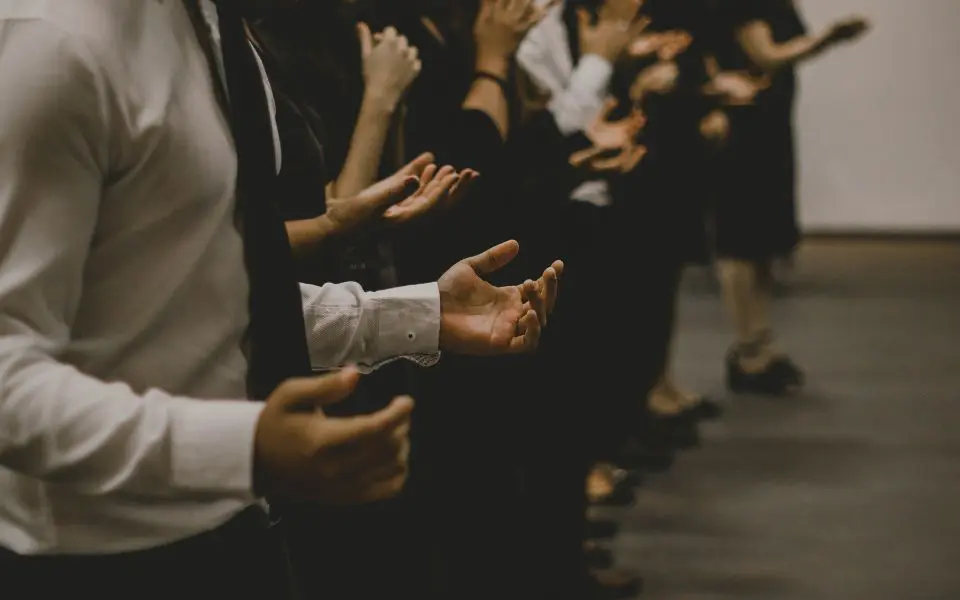Both meditation and prayer inspire us to dig deeper into the present moment and reflect on what really matters. After a meditation session or a primary religious practice, you'll likely feel a positive attitude, such as an attitude of gratitude, which renews your perspective on life. However, meditation and prayer are still distinct practices that differ. In this article, we'll compare meditation vs prayer to help you see the difference between the two to help you decide which is the best fit for your situation, well-being, and life.
What is meditation?
Meditation is a practice that encourages you to take a deep breath repeatedly and focus on the present. Meditation requires you to spend time living in the moment and focusing on your breathing. Mindfulness meditation allows you to become more mindful during practice. However, the goal is to help encourage more mindful living during moments outside of your practice. The more you meditate, the better equipped you become to be mindful during difficult conversations, stressful moments, and hard times. You'll likely experience a sense of peace the more you practice meditation, and you'll also reduce stress overall.

What is prayer?
Prayer is a religious act you do that connects you with a higher power: God. Every religion has its own prayer and its own higher power that they worship. In Islam, it's Allah; for Christians, it's God. The role of faith and hope come into play in our prayers. For instance, prayer often seeks a desire for something in the future. You might hope that someone recovers from illness, that you survive a difficult moment, or that someone out there is listening to your needs, so that they could be met.
Meditation vs Prayer: What's the Difference
1. Who you connect with
There's a crucial difference between meditation vs prayer and that's who you connect with during your practice. Prayer involves you connecting with a higher divine power, such as God, Allah, or a god. However, meditation requires you to connect with yourself. In religion, you may seek the support of the universe to help you solve your problems. In a mindfulness meditation practice, you'll be clearing your mind so that you can solve your problems yourself. It's almost a way to seek an epiphany or a moment of clarity to help you resolve your situation. Ultimately, in prayer, the person you hope to receive guidance and healing from is outside of yourself and is spiritual in nature. And in meditation, it's you who will get yourself through it all.

2. Mental health benefits
Christian prayer and meditation both help you reduce stress, find inner peace, and seek wisdom. However, the biggest difference in mental health benefits comes from prayer. Often, people turn to prayer in moments of chaos and turmoil. For Christians, hope plays a big role in overcoming obstacles and life challenges. Meditation doesn't give you hope in the same way that a prayer can. In prayer, we may believe in someone who will listen to us and help someone overcome illness. In meditation, you're more likely to accept someone's illness and the state of death as a natural part of life, so you can let go and allow nature to run its course. Meditation is more about acceptance, while prayer is more about hope. They both play a role in our minds being able to process difficult moments in life; they only do it differently. Neither one is better than the other; they're just one of the differences.
3. A unique intention
When comparing prayer vs meditation, their intentions are unique from one another. Prayer and the Bible or Quran help guide you through life's journey. The spiritual intention is about being able to praise your divine god and thank Him for the life you've been given, the wisdom you've received, the past leading up to your moment in history, and an understanding of your role in society to better the world. Meditating is more about a stillness of the mind where you bring awareness of your actions and behaviors. It's about getting out of your head and into the world, living with kindness and empathy. Meditating is about making people more mindful of their actions, whereas prayer is about being grateful to the universe's Creator.
4. How it's vocalized
A prayer is typically vocalized by talking out loud to a spiritual source. You speak out loud because you're speaking directly to someone listening to your words. Your prayers are the part of your day where you communicate with a higher power. For some religions, you'll pray once or twice a day, such as in the morning or evening. However, for other religions like Islam, you'll pray five times each day. Meditation is typically practiced quietly. No words will be spoken aloud during a practice. Instead, you quietly focus on the present moment as your meditate. You'll notice where tightness is in your body during a body scan meditation. However, you'll never speak out loud during a practice. Yet, you might follow along to a meditation app like Declutter The Mind, where a guide speaks during your practice to help you maintain your focus as your meditate.
https://www.youtube.com/watch?v=pyy3dHW4cSw
5. How you reflect
Prayer and meditation both cause you to reflect on your lives, but there's a difference in how they do so. In prayer, you reflect on your actions, so you can earn a good eternal life in heaven and avoid the abyss of hell. In meditation, you focus on the present moment, where you have the most control over your actions. You might pray to seek forgiveness on wrongdoings. And you might meditate to keep focusing on being mindful in the present moment instead of getting caught up in your mind. You're more likely to accept wrongdoings and make better decisions in the present moment when you meditate, instead of repeatedly punishing yourself for the past without any new action.
6. Who it's done with
Both prayer and meditation can be done with others and as a solo activity. However, more often than not, prayer is done with others in a Church, synagogue, or other place of worship. And meditation is often done alone in a quiet place within your home. You might still meditate in a group setting with your coworkers or at a yoga studio, but it's far less common to do. And a prayer can often be done at home alone as well. In general, praying with others allows you to form a connection with your community and do good together. In meditation, it's the solitude that causes you to reflect on your self, gain a moment of silence to yourself, and spark some new ideas that'll improve yourself.

7. Where your mind is
Prayer and meditation both help calm the mind. However, when comparing prayer vs meditation, where your mind is differs. In prayer, you might choose to reflect on your past by asking for forgiveness for your past mistakes. Or you might be seeking hope for a better future. However, rarely does prayer reflect on the present moment. That's where meditation comes in. Meditation is all about being present in this moment right now. For example, a friend who is having a conversation with you in this moment, will get all of your attention. Whereas, in a prayer, you might reflect on things you shouldn't have said in the conversation and seek forgiveness for it. Meditation would be more likely to encourage you to ask for forgiveness during the conversation and try to make it up to your friend before one of you leaves. Its benefits are all about doing what you can mindfully in the right now. Whereas in prayer, you look towards a divine entity to help you out.
8. Length of practice
A prayer and meditation vary in the length of time they take. Prayers are typically spoken for a minute or two. A meditation practice typically lasts somewhere between five minutes to about an hour, but most people tend to meditate somewhere around 20 minutes.
You can pray and follow along to a meditation every day. Both are easy to fit into a morning routine. Prayer and meditation when combined can be a powerful force to help you connect with a god or yourself. If you're more faith-based, a quick prayer might be just what you need. However, you can also find a quick meditation when you feel anxious or worried about something.
https://www.youtube.com/watch?v=MKDvoxMIQQE
9. Level of difficulty
The hardest part of a prayer is memorizing all the words. However, if you're in a Christian school, you'll likely recite prayers daily, which will make remembering them easy. You can also create your own prayer that helps you during difficult times, when you're in need of a god or Jesus.
However, when comparing meditation vs prayer, meditation tends to have a higher level of difficulty. It's essential to know how to focus. However, when following a guided meditation, you'll quickly realize how hard it is to focus on your breath without getting lost in thoughts. A five-minute meditation can be challenging for beginners. However, the longer you meditate for, the harder it becomes to keep that focus going.
You can also amp up the difficulty of meditation by going on a meditation retreat or a silent retreat, where you meditate for most of the day for an entire weekend or even full week. Many people will build a connection with themselves, but it can also break your mind to maintain that stillness for so long without talking to anyone.
10. Their relation to religion
What's the difference between prayer vs meditation? Their relation to religion, of course. Those who actively pray might read stories about Jesus in the Bible or of other prophets or gods in other religious texts. When they speak the words of their prayer, they believe someone is listening to them, which no one can see. They believe in a spirit who will help them through life and all of its rollercoaster of a journey.
And when comparing to meditation, meditation and prayer are different in this respect. Meditation is more secular in nature. You don't need to be Christian, Muslim, Jewish, Hindu, Atheist, or any other religion to practice it. It's kind of like yoga in the sense that anyone can practice it. You might seek understanding when meditating or practice gratitude, however, you'll only be doing it for yourself. Unlike prayer, meditation isn't for a higher god, a best friend, or someone in need; it's for your own mental clarity.

Conclusion
Prayer and meditation have a lot in common, which can make it seem like they're similar in nature. However, they are many differences. If you're a religious person, praying may be more aligned with how you communicate your needs. However, meditation can be a good fit for anyone whether they're religious or not. You could easily fit both of them into your daily routine if you needed to. You could try out any meditation for free on the Declutter The Mind app.







